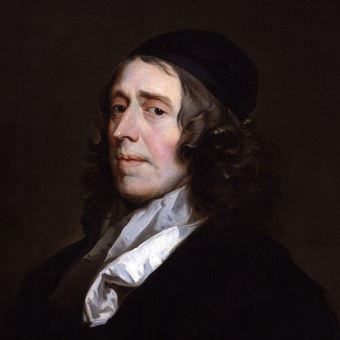CHURCH HISTORY
Church Foundations
John Owen
By Brandon Markette

Owen lived through tumultuous times. In 1642 the first English Civil War began. This schism was fought between Parliamentarians and Royalists. The Parliamentarians supported the rights of Parliament while the Royalists wholly supported the king's authority. Given the King's role as the head of the Church of England, one might expect the clergy to have sided with the Royalists. In Owen's case, that was not true.
Owen's Puritan upbringing and beliefs included a strong belief in Calvinism. This view of the gospel, named for John Calvin, was at odds with the Arminian view of the national church.* Further, the national church was Episcopal in government. Owen disapproved. He believed that churches ought to be congregationally governed. So, it is not a surprise that Owen was a Parliamentarian.
This second issue, how churches ought to be governed, also put Owen at odds with many of his fellow Puritans, who were Presbyterian. Despite the difference with his fellow puritans, Owen desired to see all puritans — Presbyterian and Congregational — working together against the King's armies to reform the national church.** In 1648, Owen began to put his congregational views to work as he began a congregational church in Coggeshall. This work, while significant in his life and the development of his thinking, would be short lived. Very soon Owen was called to serve as a Chaplain in the parliamentary army, fighting against the royalist cause.
From 1642 to 1651, three civil wars wracked England. In the end, King Charles I's armies lost and the Commonwealth's republican government ruled England. From 1651 until his death in 1658, Oliver Cromwell served as Lord Protector over the Commonwealth. For Owen, this meant an opportunity to reform the national church. Cromwell, to whom Owen was a counselor, sent Owen to Oxford in 1651. This time Owen came not as a student, but as a reformer. He sought to reform Oxford and the national church through this new position.
Owen did not have the necessary time to accomplish his goals. After Oliver Cromwell died in 1658 his son took up the role of Lord Protector. After only seven months the Army removed Richard Cromwell. Then, in 1660, Charles II of England returned, retaking the throne. Thus did Owen's time at Oxford end, and he, along with other like-minded clergy, left the national church and became dissenters.
For the remaining years of his life, Owen continued to pastor, teach, and write. His writing shows him to be one of the foremost theological minds England ever produced. As he defended traditional orthodoxy and his beloved congregationalism, Owen sought to commend the Reformed view of Christianity. Doing so led one of his contemporaries, Robert Asty, to describe Owen as, "a person of incomparable abilities."
Though Owen is one of the greatest Puritan theologians, he is not as popular as others, such as Richard Baxter or John Bunyan. Owen did not write in a popular style, making his writings more challenging to enjoy and understand. For that reason, Peter Toon refers to Owen as "the theologian's theologian."
* For the differences between Calvinism and Arminianism, see the GotQuestions article.
** Episcopalian, Presbyterian, and congregation are types of church government. Basically, Episcopalians are governed by an "episcopate," or single ruler, like a bishop or pope. A Presbyterian church is governed by a presbytery, or board of elders. A congregational church is governed by the vote of the congregation.
Image Credit: John Greenhill; "John Owen"; 1676; Public Domain.
Tags: Calvinism-Tulip | Church-Issues | History-Apologetics | Political-Issues | Theological-Beliefs
comments powered by Disqus
Published 7-17-2014

